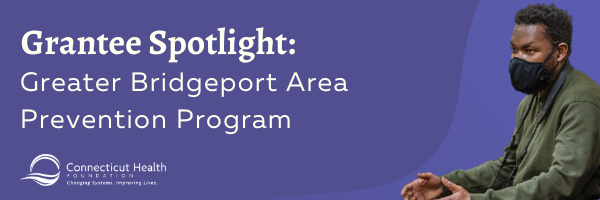
The topic of the virtual conversation was COVID-19 vaccines. Rev. Nancy Kingwood and her colleagues at Greater Bridgeport Area Prevention Partnership wanted to make sure people in their community had good information about protecting themselves against the virus. But they soon realized that for one participant, there was a more pressing topic.
The man shared that he was grieving his loved ones who died from COVID-19.
“What I realized was that the vaccine was still enmeshed with his grief. We started introducing something new, but so many were still focused on loss,” Kingwood said.
As a result, a community ambassador from GBAPP had a longer, one-on-one conversation with the man about his experiences. The organization designed its virtual events to allow for one-on-one conversations, so participants could ask questions and share personal information privately. “These conversations were intimate and informative,” Kingwood, the organization’s president and executive director, noted. “It was a real sign of trust from the community.”
GBAPP hired community ambassadors and hosted virtual conversations as part of a “trusted messenger” grant from the Connecticut Health Foundation. The foundation began awarding these grants in 2020 to support community organizations to deliver information and answer questions about COVID-19, particularly in communities of color that experienced disproportionate rates of COVID-19 cases and deaths.
In 2021, the trusted messenger grantees added information about vaccines to their outreach work. GBAPP was one of 15 organizations funded as part of the foundation’s trusted messenger grant initiative. Many of these organizations used the grants to expand their outreach work and understand and address the needs of residents who might be hesitant about the vaccine or faced challenges to accessing it. This was especially important in communities of color, where people were significantly less likely to have been vaccinated, especially in the early months of the vaccine rollout.

Rev. Nancy Kingwood, president and executive director of GBAPP
For the leaders of GBAPP, serving as trusted messengers was a natural fit. The organization provides a wide range of community-based services, including healthy relationship programming for teens, housing support, substance use prevention and harm reduction, and HIV treatment.
Since 2020, GBAPP has distributed clear information about COVID-19 and ways to stay safe. In addition to hosting virtual conversations, the organization reached people by posting key information on social media platforms, collaborating with local radio stations, advertising on busses, interviewing medical experts, and working with other community partners to distribute flyers.
In 2021, GBAPP hired four community residents to serve as community ambassadors and assist with virtual outreach and door-knocking in predominantly Black neighborhoods in Bridgeport.
Because they had more time to dedicate to conversations than GBAPP’s existing staff, the community ambassadors were able to deeply engage people in the community and those participating in GBAPP programs. They also went door-to-door and had conversations in everyday places like grocery stores.
“The ambassadors really emerged as an anchor of our messaging,” Kingwood said. “They’re regular people.”
In addition to sharing information about COVID-19, the ambassadors talked about their own experiences with issues such as vaccine hesitancy or navigating the medical system.
While the community ambassadors shared personal experiences, the virtual conversations allowed people to hear from experts. Kingwood said these efforts, “helped to make people feel more empowered, and connected people to medical professionals, mental health professional, clergy, and policymakers.”
GBAPP leaders were mindful of the need to be delicate with messaging because some community members were hesitant about getting vaccinated. Kingwood noted that while society has made some progress, there is still have a long way to go when re-building trust with communities that have been harmed by the health care system.
“For some, the conversation regarding the Tuskegee Study started to re-emerge as an event not too long ago in our history, and we had to embrace those concerns in a non-judgmental way, and we had to talk about it,” Kingwood said.
GBAPP’s trusted messenger initiative reached thousands of people on social media. Nearly 300 people participated in the virtual conversation series. Twenty-seven people told GBAPP staffers they received their COVID-19 vaccine because of this initiative.
Going forward, Kingwood emphasized the importance of staying persistent as the pandemic continues, including supporting those with children ages 5 to 11 who are now eligible for the vaccine. Continued funding for this work to be able to provide key information to the community is crucial, she noted.
Most importantly, she said, is working in partnership with the community.
“We have a moment in time to positively influence someone’s decision-making, and we all really must listen to what community members are telling us,” she said.